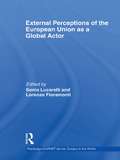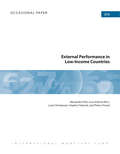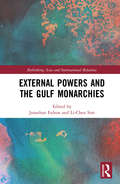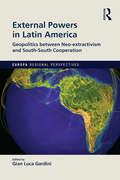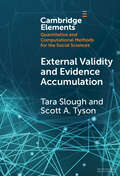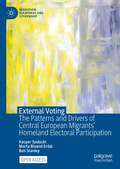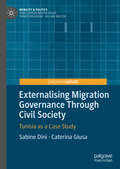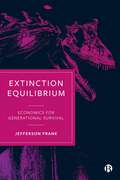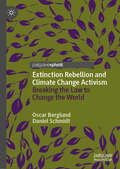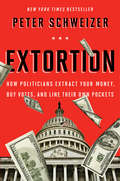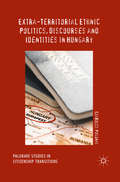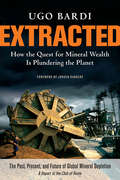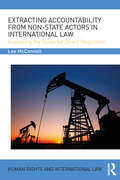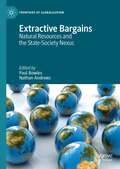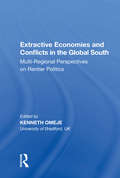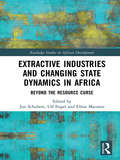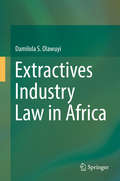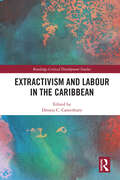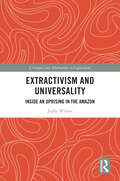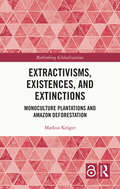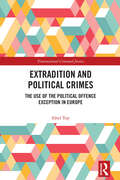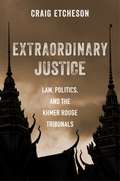- Table View
- List View
External Perceptions of the European Union as a Global Actor (Routledge/GARNET series)
by Lorenzo Fioramonti Sonia LucarelliThis book examines how the European Union (EU) is perceived beyond its borders in the US; the Middle East: Israel, Palestinian territories, Lebanon, Iran; Russia; China; India; Brazil and South Africa. The book also analyses the main perceptions of the EU in some key international institutions, including the World Bank; World Trade Organization, United Nations, African Union; and transnational actors, including non-Western media such as Al Jazeera. It seeks to provide a thorough analysis of the implications that these perceptions might have for the global role of the EU. By taking this approach and by providing both conceptual and empirical arguments, the volume provides an innovative perspective on the analysis of the EU as a global actor. It also strengthens a research agenda on the EU external image: an underdeveloped area of investigation in which the editors and the main contributors to this volume have played a pioneering role in the past few years. It will be of strong interest to academics and students of international politics, European studies and development studies.
External Performance in Low-Income Countries
by Alessandro Prati Luca Antonio Ricci Lone Christiansen Stephen Tokarick Thierry TresselAssessments of exchange rate misalignments and external imbalances for low-income countries are challenging because methodologies developed for advanced and emerging economies cannot be automatically applied to poorer nations. This paper uses a large database, unique in the set of indicators and number of countries it covers, to estimate the relationship in low-income countries between a set of fundamentals in the medium to long term and the real effective exchange rate, the current account, and the net external assets position.
External Powers and the Gulf Monarchies (Rethinking Asia and International Relations)
by Jonathan Fulton Li-Chen SimThe Gulf monarchies have been generally perceived as status quo actors reliant on the USA for their security, but in response to regional events, particularly the Arab Spring of 2011, they are pursuing more activist foreign policies, which has allowed other international powers to play a larger role in regional affairs. This book analyses the changing dynamic in this region, with expert contributors providing original empirical case studies that examine the relations between the Gulf monarchies and extra-regional powers, including the USA, Russia, China, India, Brazil, Turkey, Japan, South Korea, France, and the United Kingdom. At the theoretical level, these case studies explore the extent to which different international relations and international political economy theories explain change in these relationships as the regional, political and security environment shifts. Focusing on how and why external powers approach their relationships with the Gulf monarchies, contributors ask what motivates external powers to pursue deeper involvement in an unstable region that has seen three major conflicts in the past 40 years. Addressing an under-analysed, yet important topic, the volume will appeal to scholars in the fields of international relations and international political economy as well as area specialists on the Gulf and those working on the foreign policy issues of the extra-regional powers studied.
External Powers in Latin America: Geopolitics between Neo-extractivism and South-South Cooperation (Europa Regional Perspectives)
by Gian Luca GardiniThis book examines the role of external powers in Latin America in the 21st century. Non-traditional partners have significantly increased their political and economic engagement with the continent. Five key questions arise: why has this surge taken place; when has it happened; in which regions and sectors is it mostly felt; what is the Latin American perspective; and what are the actual results? The book analyses 16 case studies: the United States, the European Union, China, Russia, Japan, Canada, India, Turkey, Iran, Israel, South Korea, Taiwan, Indonesia, the ASEAN countries, South Africa and Australia. The spectrum of existing explanations in the literature spans from neo-extractivism to South-South cooperation. This volume places them in context and proposes a more multifaceted approach, stressing a combination of systemic factors and internal dynamics both in Latin America and in the external partner countries. Geopolitics still matters and so do nation states, their interests and leaders. Ultimately, this surge in engagement has largely reproduced past patterns. Are new partners that different from the old ones?
External Validity and Evidence Accumulation (Elements in Quantitative and Computational Methods for the Social Sciences)
by Tara Slough Scott A. TysonThe accumulation of empirical evidence that has been collected in multiple contexts, places, and times requires a more comprehensive understanding of empirical research than is typically required for interpreting the findings from individual studies. We advance a novel conceptual framework where causal mechanisms are central to characterizing social phenomena that transcend context, place, or time. We distinguish various concepts of external validity, all of which characterize the relationship between the effects produced by mechanisms in different settings. Approaches to evidence accumulation require careful consideration of cross-study features, including theoretical considerations that link constituent studies and measurement considerations about how phenomena are quantifed. Our main theoretical contribution is developing uniting principles that constitute the qualitative and quantitative assumptions that form the basis for a quantitative relationship between constituent studies. We then apply our framework to three approaches to studying general social phenomena: meta-analysis, replication, and extrapolation.
External Voting: The Patterns and Drivers of Central European Migrants' Homeland Electoral Participation (Migration, Diasporas and Citizenship)
by Marta Bivand Erdal Kacper Szulecki Ben StanleyThis open access book is the first monograph that brings together insights from comparative politics, political sociology, and migration studies to introduce the current state of knowledge on external voting and transnational politics. Drawing on new data gathered within the DIASPOlitic project, which created a comparative dataset of external voting results for 6 countries of origin and 17 countries of residence as well as an extensive qualitative dataset of 80 in-depth interviews with four groups of migrants, this book not only illustrates theoretical problems with empirical material, but also provides answers to previously unaddressed questions. The empirical material focuses on the European context. The Eastern Enlargement of the European Union (2004-2007) triggered a westward wave of migration from Central and Eastern European countries which faced the expansion of existing émigré communities and the emergence of new ones. As this process coincided with the expansion of migrant voting rights, the result is a large set of populous diaspora communities which can potentially have a significant impact on country electoral politics, making the study of external voting highly relevant. This book’s introduction takes stock of current research on transnational politics and external voting, presenting core puzzles. The following chapter introduces the context of intra-European migration and the political situation in Central-Eastern European sending countries. The next two sections address the empirical puzzles, drawing on new quantitative and qualitative. The conclusion takes stock of the evidence gathered, discusses the normative problem of non-resident voters enfranchisement, connects external voting to the broader debate on political remittances and finally, maps the terrain ahead for future research. This concise, empirically grounded introduction to external voting is critical reading in structuring the debate around migration and shaping research agendas for the future.
Externalising Migration Governance Through Civil Society: Tunisia as a Case Study (Mobility & Politics)
by Sabine Dini Caterina GiusaThis book investigates how the externalisation of EU migration policies is implemented in Tunisia after the fall of the Ben Ali regime in 2011 through the involvement of civil society organisations. The ‘democratic transition’ initiated by the Tunisian Revolution led to the emergence of a ‘vibrant civil society’ as a new actor in the implementation of migration policies. In a country where migration issues are highly politicised and have strongly entered the public space, civil society is now included in the EU-Tunisia negotiation process and is assigned the role of an intermediary for the implementation of controversial European policies related to sedentarisation of the Tunisian population and to the construction of Tunisia as a ‘country of destination’. The volume concludes by suggesting an alternative way of thinking about migrant struggles challenging the European border regime as ‘uncivil society’ struggles.
Extinction Equilibrium: Economics for Generational Survival
by Jefferson FrankGeneration Z has grown up with a global financial crisis, a pandemic, the climate emergency, growing autocracy and wars. Survival, not just equity, is at stake. As debate rages about how to ensure a fairer and sustainable society, this book challenges short-sighted economic policies, asking where we want to be in 20 years’ time and how we might get there. Offering fresh, and sometimes counterintuitive, thinking on a range of economic issues including monetary policy, housing and university funding, it argues in favour of policy guardrails to protect the future, higher interest rates, and a burst of inflation. Robots and AI should be seen as positive replacements for population growth. This is an original, readable and entertaining take on how we can change course before it is too late.
Extinction Rebellion and Climate Change Activism: Breaking the Law to Change the World
by Daniel Schmidt Oscar BerglundThis book summarises and critiques Extinction Rebellion (XR) as a social movement organisation, engaging with key issues surrounding its analysis, strategy and tactics. The authors suggest that XR have an underdeveloped and apolitical view of the kind of change necessary to address climate change, and that while this enables the building of broad movements, it is also an obstacle to achieving the systemic change that they are aiming for. The book analyses different forms of protest and the role of civil disobedience in their respective success or failure; democratic demands and practices; and activist engagement with the political economy of climate change. It engages with a range of theoretical perspectives that address law-breaking in protest and participatory forms of democracy including liberal political theory; anarchism and forms of historical materialism, and will be of interest to students and scholars across politics, international relations, sociology, policy studies and geography, as well as those interested in climate change politics and activism.
Extortion
by Peter SchweizerA bombshell investigation reveals how Washington really works: politicians extort money from us, then use it to buy each other's votes. Best-selling author Peter Schweizer reveals: *Obama's "Protection Money": How the Obama Administration targeted industries for criminal investigation but chose not to pursue key political donors. *John Boehner's "Tollbooth": How the Speaker of the House extracts money by soliciting political donations before he will hold crucial votes on the House floor. *The "Slush Fund": How politicians extract "campaign contributions" and then convert them to bankroll lavish lifestyles complete with limos, private jets, golf at five-star resorts, fine wines, and cash for family members. *Capitol Hill's "Underground Economy": How congressmen use a little-known loophole that allows them to secretly link their votes to cash. Extortion finally makes clear why Congress is so dysfunctional: it's all about making money, not making law.ut as guides to that very complexity. Worst of all, they use the recent innovation of "leadership PACs" to buy loyalty and votes. Our leaders no longer care about us; they care only about their war chests. Extortion is a bombshell of a book that reveals: * how both political parties maintain a secret dues list, forcing members of Congress to pay to maintain key leadership positions. * how those key leaders, in turn, use their positions to extort money from donors. * how leadership PACs are used to underwrite politicians' lifestyles and purchase each other's loyalties. * how the Department of Justice has radically expanded the Foreign Corrupt Practices Act to shake down key targets--while ignoring much more obvious targets on Wall Street. After naming names and revealing the shocking extent of the problem, Schweizer argues persuasively that we can do better. If Washington adopted some of the ethics laws that govern state politicians, we would be better off. If Congress outlawed leadership PACs, we would be better off. Most of all, if voters understand all the facts in Extortion, we ourselves can rise in revolt.
Extortion: How Politicians Extract Your Money, Buy Votes, and Line Their Own Pockets
by Peter SchweizerA bombshell investigation reveals how Washington really works: politicians extort money from us, then use it to buy each other’s votes. Best-selling author Peter Schweizer reveals: *Obama’s "Protection Money": How the Obama Administration targeted industries for criminal investigation but chose not to pursue key political donors. *John Boehner’s "Tollbooth": How the Speaker of the House extracts money by soliciting political donations before he will hold crucial votes on the House floor. *The "Slush Fund": How politicians extract "campaign contributions" and then convert them to bankroll lavish lifestyles complete with limos, private jets, golf at five-star resorts, fine wines, and cash for family members. *Capitol Hill’s "Underground Economy": How congressmen use a little-known loophole that allows them to secretly link their votes to cash. Extortion finally makes clear why Congress is so dysfunctional: it’s all about making money, not making law.
Extra-Territorial Ethnic Politics, Discourses and Identities in Hungary
by Szabolcs PogonyiThis book explores the causes and consequences of the discursive and legal construction of the Hungarian transborder nation through the institutionalization of non-resident citizenship and voting. Through the in-depth analysis of Hungarian transborder and diaspora politics, this book investigates how the political engagement of non-resident Hungarians impacts inter- and intra-state ethnic relations. In addition, the research also explores how institutional changes and shifting discursive strategies reify and redefine ethnic belonging narratives and the self-perception of Hungarians living outside the country. The research uses a multidisciplinary qualitative methodology which includes institutional (historical, rational choice and sociological) analysis, discourse analysis as well as interpretive methods. Through the inventive application of multiple methodologies, the book goes beyond the mostly institutional/legal analysis dominant in the study of citizenship.
Extracted
by Jorgen Randers Ugo BardiAs we dig, drill, and excavate to unearth the planet's mineral bounty, the resources we exploit from ores, veins, seams, and wells are gradually becoming exhausted. Mineral treasures that took millions, or even billions, of years to form are now being squandered in just centuries-or sometimes just decades. Will there come a time when we actually run out of minerals? Debates already soar over how we are going to obtain energy without oil, coal, and gas. But what about the other mineral losses we face? Without metals, and semiconductors, how are we going to keep our industrial system running? Without mineral fertilizers and fuels, how are we going to produce the food we need?Ugo Bardi delivers a sweeping history of the mining industry, starting with its humble beginning when our early ancestors started digging underground to find the stones they needed for their tools. He traces the links between mineral riches and empires, wars, and civilizations, and shows how mining in its various forms came to be one of the largest global industries. He also illustrates how the gigantic mining machine is now starting to show signs of difficulties. The easy mineral resources, the least expensive to extract and process, have been mostly exploited and depleted. There are plenty of minerals left to extract, but at higher costs and with increasing difficulties.The effects of depletion take different forms and one may be the economic crisis that is gripping the world system. And depletion is not the only problem. Mining has a dark side-pollution-that takes many forms and delivers many consequences, including climate change. The world we have been accustomed to, so far, was based on cheap mineral resources and on the ability of the ecosystem to absorb pollution without generating damage to human beings. Both conditions are rapidly disappearing. Having thoroughly plundered planet Earth, we are entering a new world. Bardi draws upon the world's leading minerals experts to offer a compelling glimpse into that new world ahead.
Extracting Accountability from Non-State Actors in International Law: Assessing the Scope for Direct Regulation (Human Rights and International Law)
by Lee James McConnellThe human rights of communities in many resource-rich, weak governance States are adversely affected, not only by the acts of States and their agents, but also by powerful non-State actors. Contemporary phenomena such as globalisation, privatisation and the proliferation of internal armed conflict have all contributed to the increasing public influence of these entities and the correlative decline in State power. This book responds to the persistent challenges stemming from non-State actors linked to extractive industries. In light of the intersecting roles of multinational enterprises and non-State armed groups in this context, these actors are adopted as the primary analytical vehicles. The operations of these entities highlight the practical flaws of existing accountability regimes and permit an exploration of the theoretical challenges that preclude their direct legal regulation at the international level. Drawing insights from discursive democracy, compliance theories and the Pure Theory of Law, the book establishes a conceptual foundation for the creation of binding international obligations addressing non-State actors. Responding to the recent calls for a binding business and human rights treaty at the UN Human Rights Council, and the growing influence of armed non-State actors, the book makes a timely contribution to debates surrounding the direction of future developments in the field of international human rights law.
Extracting Profit: Imperialism, Neoliberalism, and the New Scramble for Africa
by Lee WengrafThe choke hold of debt and austerity of the late twentieth century paved the way for severe assaults on African working classes through neoliberal privatization and deregulation. And while the scramble for Africa's resources has heightened the pace of ecological devastation.
Extractive Bargains: Natural Resources and the State-Society Nexus (Frontiers of Globalization)
by Paul Bowles Nathan AndrewsThis book is the first to focus on state-led ‘extractive bargains,’ designed to reach a social consensus on the extent of extractive activities, how they should be governed and their negative consequences mitigated. These state-led ‘bargains’ have taken a number of different forms and offer varying degrees of promise in meeting environmental and social concerns. The book critically examines ‘bargains’ in states across the Global North and the Global South, incorporates Indigenous issues, and judiciously assesses their prospects for promoting long-term sustainability. It focusses on mineral and fossil fuel extraction in particular including bargains designed to govern the former as the demand for minerals used in “green energy” increases and to limit the use of the latter.The book will be of interest to students and researchers of global studies, global political economy, political science, political sociology, sustainability, environmental sociology, development studies and geography. Chapter 1 is available open access under a Creative Commons Attribution 4.0 International License via link.springer.com.
Extractive Economies and Conflicts in the Global South: Multi-Regional Perspectives on Rentier Politics
by Kenneth OmejeThe majority of developing countries in the Global South are evidently rich in natural resources, but paradoxically blighted by excruciating poverty and conflicts. This paradox of deprivation and war in the midst of plenteous resources has been the subject of great debate in international political economy in contemporary history. This book contributes to the debate by examining the underlying structures, actors and contexts of rentier politics and how they often produce and aggravate conflicts in the various extractive economies and regions of the Global South. The book critically explores the theories of rentier economies and natural resource conflicts, as well as the practical ramifications of rentier politics in the Global South with all their resonance for political economy and security in the Global North.
Extractive Industries and Changing State Dynamics in Africa: Beyond the Resource Curse (Routledge Studies in African Development)
by Jon Schubert Ulf Engel Elísio MacamoThis book uses extractive industry projects in Africa to explore how political authority and the nation-state are reconfigured at the intersection of national political contestations and global, transnational capital. Instead of focusing on technological zones and the new social assemblages at the actual sites of construction or mineral extraction, the authors use extractive industry projects as a topical lens to investigate contemporary processes of state-making at the state–corporation nexus. Throughout the book, the authors seek to understand how public political actors and private actors of liberal capitalism negotiate and redefine notions and practices of sovereignty by setting legal, regulatory and fiscal standards. Rather than looking at resource governance from a normative perspective, the authors look at how these negotiations are shaped by and reshape the self-conception of various national and transnational actors, and how these jointly redefine the role of the state in managing these processes for the ‘greater good’. Extractive Industries and Changing State Dynamics in Africa will be useful for researchers, upper-level students and policy-makers who are interested in new articulations of state-making and politics in Africa.
Extractives Industry Law in Africa
by Damilola S. OlawuyiThe book provides a systematic examination of the legal, fiscal and institutional frameworks for the commercial development of petroleum and solid mineral resources in Africa. First, it considers the values, assumptions, and guiding principles underpinning legislation and governance in Africa’s extractive sector. It then provides detailed and comparative evaluations of regulatory frameworks, pricing, local content, procurement, sales, and contractual arrangements across African extractive industries. Further, the book assesses how questions of business and human rights risks, accountability, corporate social responsibility, waste and pollution control, environmental justice, and participatory development have been addressed to date, and how they could be addressed better in the future. Enhancing readers’ understanding of the geography, sources and scope of extractive resources in Africa, the book explains how corporations can effectively identify, mitigate and prevent legal and business risks when investing in African extractive industries. Lastly, it discusses the innovative legal strategies and tools needed to achieve a sustainable and rights-based extractive industry.Written in a user-friendly style, the book offers a valuable resource for corporations, investors, environmental and human rights administrators, advocates, policymakers, judges, international negotiators, government officials and consultants who advise on, or are interested in, petroleum and solid mineral investments in Africa. It also offers students and researchers an authoritative guidebook to the current state of extractive industry laws and institutions in Africa. Numerous examples of how international legal norms could be used to help revitalize the underlying legal and fiscal regimes in African extractive industries – to make them more robust, accountable, sustainable and rights-based – round out the coverage
Extractivism and Labour in the Caribbean (Routledge Critical Development Studies)
by Dennis C. CanterburyThis book explores the impact of resource extraction and the dynamics of great powers competing for natural resources in the Caribbean. The book analyzes labour–capital relations between China, the United States, the European Union, and Russia in the Caribbean, as competition increases with the arrival of non-traditional sources of foreign investments in infrastructure from the East. Chapters assess these dynamics through varying historical and current forms of worker, community, and organization resistance in the Caribbean’s extractive industries from the 1970s to the present. In doing so, the book critically analyzes the interplay of extractive capital with labour unions, community organizations, management, and the state, particularly regarding the struggle for higher wages, improved working conditions, and the broader issues of extractive capitalism and underdevelopment, dispossession, social exclusion, and environmental degradation. The first book on Extractivism and Labour in the Caribbean and a major contribution to critical development studies literature, it will appeal to policymakers as well as students and scholars in the fields of development studies, development economics, sociology, politics, and international relations.
Extractivism and Universality: Inside an Uprising in the Amazon (Critiques and Alternatives to Capitalism)
by Japhy WilsonExtractivism and Universality tells the inside story of a spontaneous uprising in the Ecuadorian Amazon in 2017, in which mestizo, Black and Indigenous workers and communities confronted the combined forces of a multinational oil company and a militarized state. It documents a rapidly evolving battle that achieved a remarkable victory, and captures the flourishing of an insurgent form of political universality in which racial, ethnic, and cultural divisions were suddenly and powerfully overcome. Intervening in debates on the resistances and alternatives developed by the inhabitants of resource extraction zones, the book takes the reader deep inside a rebellion on an Amazonian oil frontier and offers a unique insight into insurgent universality in the lived reality of its material existence. It argues that the dominant decolonial dichotomy between Eurocentric universalism and an Indigenous pluriverse should be replaced by an approach that is attentive to manifestations of universality performed by diverse subaltern subjects. And it does so through a fast-paced fusion of radical political theory with the raw first-person style of gonzo journalism. It will appeal to scholars and students across the social sciences with interests in political and social theory, social movements, labour relations, and the political ecology of extractivism.
Extractivisms, Existences and Extinctions: Monoculture Plantations and Amazon Deforestation (Rethinking Globalizations #1)
by Markus KrögerThis book explores the existential redistributions that extractivist frontiers create, going beyond existing studies by bringing into the English-language discussion much of the wisdom from Latin American rural and forest communities’ understandings of extractivist phenomena, and the destruction and changes in lives and lived environments they create. The author explores the many different types of extractivism, ranging from agroextractivist monocultures to mineral extraction, and analyzes the differences between them. The existential transformations of Brazil's Amazon and Cerrado regions, previously inhabited by Indigenous people but now being deforested by colonizers who expand soybean plantations, are analyzed in detail. The author also compares extractivisms with the local and broader existential changes through global production networks and their shifts, produced by monoculture plantation-based extractivist operations. Anchored in the author’s own ethnographic data and comparison of lessons across multiple extractivist frontiers, the chapters integrate the many accounts of violence, and onto-epistemic and moral changes in extractivist enclaves, looking at these with the help of political ontology. The book offers details on how to characterize and compare different types and degrees of extractivisms and anti-extractivisms. This transdisciplinary book provides new organizing concepts and theoretical frameworks for starting to analyze the unfolding natural resource politics of the post-coronavirus era, the advancing climate emergency, and the ever more chaotic multi-polar world. It will be of interest to students and scholars in the fields of international development, global value chains, political economy, Latin American Studies, political ecology, and international trade, as well as anyone engaged with the practical and political issues related to globalization.
Extradition and Political Crimes: The Use of the Political Offence Exception in Europe (Transnational Criminal Justice)
by Sibel TopThis book examines the evolution and current application of the political offence exception clause to extradition in Europe.The long-standing academic exploration of terrorism has recently given way to renewed interest in the political offence exception to extradition, prompted by recent events that signal a democratic downturn globally. Despite the significant curtailment – and, in some cases, the complete abolition – of the political offence exception to extradition in Europe, certain European states continue to quietly implement this exception to deny extradition requests. This work studies the development of the political offence exception in Europe by narrowing its focus from an international perspective to the European context, specifically examining the Council of Europe and the European Union, before zeroing in on the Catalan independence crisis, which offers a particularly valuable case for analysing the application of the political offence exception in the European context.By providing a detailed examination of the evolving protections for political offenders within European legal frameworks, the text updates the long overdue academic knowledge on the matter. It is therefore an essential resource for anyone interested in European criminal law and extradition, in particular. It will also be of interest to researchers, academics, and policy-makers working in the areas of criminal law, human rights law, legal theory, criminology, and political science.
Extraordinary Evil: A Short Walk To Genocide
by Barbara ColorosoFrom best-selling author Barbara Coloroso comes a timely and essential book about genocide. Through an examination of three clearly defined genocides ? the Armenian and Rwandan genocides, and the European Holocaust ? Coloroso deconstructs the causes and consequences, both to its immediate victims and to the fabric of the world at large, and proposes the conditions that must exist in order to eradicate this evil from the world. Coloroso is well known for her best-selling books that explore why children bully. In Extraordinary Evil she builds upon that research to explain why the impulse to bully is mirrored by the act of genocide. By linking the psychology of the bully to the motivation that leads a community to murder, Coloroso provides devastating and vital insight into why people kill their neighbors. Based on the author's 15 years of research and extensive travel, Extraordinary Evil is an urgently needed work in an age when acts of genocide seem to occur more frequently and are in the public's consciousness more than ever before.
Extraordinary Justice: Law, Politics, and the Khmer Rouge Tribunals
by Craig EtchesonIn just a few short years, the Khmer Rouge presided over one of the twentieth century’s cruelest reigns of terror. Since its 1979 overthrow, there have been several attempts to hold the perpetrators accountable, from a People’s Revolutionary Tribunal shortly afterward through the early 2000s Extraordinary Chambers in the Courts of Cambodia, also known as the Khmer Rouge Tribunal. Extraordinary Justice offers a definitive account of the quest for justice in Cambodia that uses this history to develop a theoretical framework for understanding the interaction between law and politics in war crimes tribunals.Craig Etcheson, one of the world’s foremost experts on the Cambodian genocide and its aftermath, draws on decades of experience to trace the evolution of transitional justice in the country from the late 1970s to the present. He considers how war crimes tribunals come into existence, how they operate and unfold, and what happens in their wake. Etcheson argues that the concepts of legality that hold sway in such tribunals should be understood in terms of their orientation toward politics, both in the Khmer Rouge Tribunal and generally. A magisterial chronicle of the inner workings of postconflict justice, Extraordinary Justice challenges understandings of the relationship between politics and the law, with important implications for the future of attempts to seek accountability for crimes against humanity.
